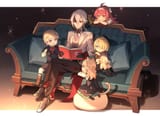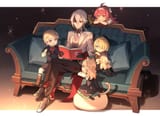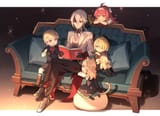>>538130017
Father and the kids will be in Nod Krai looking for Bina and her cave
4chan Search
3 results for "ea03d93b0ca6f431a970b6fea81b29d5"
"This is simply a story being recounted at a later point"
What are your thoughts on the unusual flavor of Draw Steel's troubadour (auteur)?
Draw Steel has a 4e-style warlord class, the tactician. It also has a bard-type class, the troubadour. Its three subclasses are auteur, duelist, and virtuoso. Duelists are melee swashbucklers, virtuosos are musicians, and auteurs are playwrights, storytellers, and directors:
https://steelcompendium.io/compendium/main/Rules/Classes/Troubadour/#drama-outside-of-combat
>Abilities like Guest Star, Missed Cue, and Twist at the End allow the auteur to rewrite bits of what happens in the battle by temporarily removing creatures from an encounter, bringing people back to life, or causing a new ally to appear. These abilities and features are no more powerful than any other, but they're narratively different from shooting rays of fire or swinging a sword.
>This is because, uniquely among all the subclasses in Draw Steel, the auteur knows that the combat encounter playing out at your table is really a story being told sometime later, probably in a tavern.
>When the auteur uses these abilities, they are changing that story. They rewrite stories to make them more dramatic in the telling. What actually happened is a matter of some debate. Even the people who were there don't agree on exactly what took place. How people remember it is what's important!
>This is pretty weird, but also very fun. If it's too weird for you or your table, you could always interpret those abilities as a kind of magic. A school of conjuring that really does change the battlefield, which the auteur merely flavors as rewriting the story.
For what it is worth, all but one of the auteur-specific abilities are magic-tagged by default.
Is the "auteur is telling the story afterwards" flavor fine by you, or would you find it too strange, preferring the more magical interpretation?
Draw Steel has a 4e-style warlord class, the tactician. It also has a bard-type class, the troubadour. Its three subclasses are auteur, duelist, and virtuoso. Duelists are melee swashbucklers, virtuosos are musicians, and auteurs are playwrights, storytellers, and directors:
https://steelcompendium.io/compendium/main/Rules/Classes/Troubadour/#drama-outside-of-combat
>Abilities like Guest Star, Missed Cue, and Twist at the End allow the auteur to rewrite bits of what happens in the battle by temporarily removing creatures from an encounter, bringing people back to life, or causing a new ally to appear. These abilities and features are no more powerful than any other, but they're narratively different from shooting rays of fire or swinging a sword.
>This is because, uniquely among all the subclasses in Draw Steel, the auteur knows that the combat encounter playing out at your table is really a story being told sometime later, probably in a tavern.
>When the auteur uses these abilities, they are changing that story. They rewrite stories to make them more dramatic in the telling. What actually happened is a matter of some debate. Even the people who were there don't agree on exactly what took place. How people remember it is what's important!
>This is pretty weird, but also very fun. If it's too weird for you or your table, you could always interpret those abilities as a kind of magic. A school of conjuring that really does change the battlefield, which the auteur merely flavors as rewriting the story.
For what it is worth, all but one of the auteur-specific abilities are magic-tagged by default.
Is the "auteur is telling the story afterwards" flavor fine by you, or would you find it too strange, preferring the more magical interpretation?


